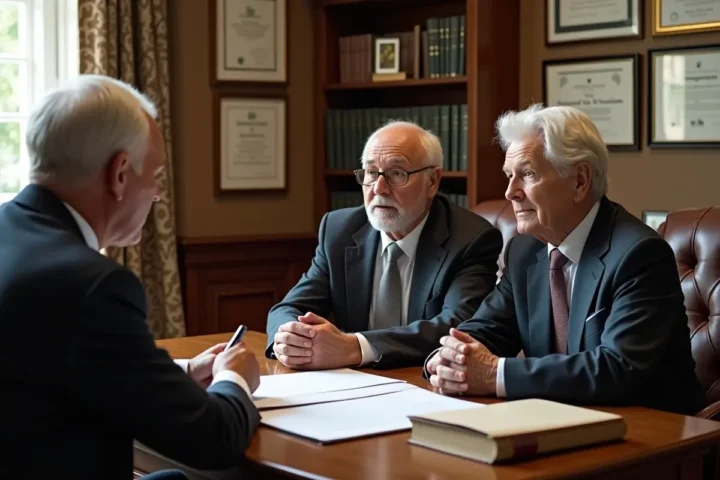Elder Law and Estate Planning: How to Avoid Common Mistakes
Are you prepared for the future? When you reflect on your situation you’ll likely find that you share views with most Americans.
Although 83% of Americans understand why estate planning is important, just 31% of them possess a will. There exists a huge disconnect between understanding the importance of estate planning and actually creating a will.
Estate planning serves people of all income levels and ages because it protects loved ones and ensures their wishes are respected. Anyone who wants to protect their family members and make sure their preferences are implemented should take this essential step.
What You’ll Discover:

- Why Estate Planning Matters at Any Age
- The 5 Most Expensive Estate Planning Mistakes
- How to Choose the Right Professional Help
- Essential Documents Everyone Needs
- Protecting Seniors from Financial Abuse
Why Estate Planning Matters at Any Age
Think estate planning is just for retirees? Think again.
Estate planning encompasses more than asset distribution following death. Estate planning ensures protection for you and your family members during your entire life. Without proper planning your family will face complex legal issues and high taxes and be forced to make tough decisions without your help.
Statistical data reveals that almost half of individuals older than 55 possess wills while four out of five people above 72 years protect their legacies. But what about younger adults?
Estate planning becomes important regardless of whether you are in your 20s or 30s. Any person with digital or physical assets should secure basic estate planning documents to protect their medical decisions during emergencies.
A board certified elder law attorney in Jacksonville can educate you on the necessary steps to take at your present stage in life. These professionals handle more than just end-of-life matters because they provide solutions during your adult life including power of attorney creation and long-term care planning.
The 5 Most Expensive Estate Planning Mistakes
Looking to protect your family from unnecessary financial burdens and avoidable family disputes? Avoid these common pitfalls:
1. Dying Without a Will (Intestate)
State laws take control of asset distribution when someone passes away without having drafted a will. Dying without a will may result in undesirable outcomes and family disputes that proper planning could prevent.
Thirty-five percent of American adults have experienced estate disputes themselves or know someone who dealt with family disagreements because of improper estate planning.
2. Neglecting to Update Your Estate Plan
Your estate plan needs a review whenever you experience major life transitions like getting married or divorced or moving to a different state. People often produce documents for their estates but neglect them for years so their plans become obsolete and fail to represent their current desires.
3. DIY Estate Planning
Online will templates appear affordable but frequently result in costly legal troubles. Estate laws vary between states and generic documents can overlook important legal stipulations. The initial money you save from DIY estate planning could result in your heirs paying ten times that amount in legal fees.
Many people try to handle these tasks alone to save money, but they often miss specific tools that keep assets out of court. A professional service helps you set up a clear path for your property and bank accounts. For example, Troy Moore’s Probate Avoidance Package is a resource for those who want to use transfer on death deeds and beneficiary designations.
These methods make sure your family has immediate access to assets so they do not have to wait for a judge to sign off. This kind of preparation is a simple way to protect your legacy and reduce stress for your heirs.
4. Forgetting about Digital Assets
The modern era makes it so numerous personal assets are stored digitally. Your digital properties such as cryptocurrency accounts, social media profiles, digital photo collections and online business ventures require detailed instructions for proper management. Your digital legacy may vanish permanently if you do not plan it properly.
5. Failing to Plan for Long-Term Care
The high monthly costs of nursing home care which exceed $8,000 in many areas result in significant financial losses for those who do not prepare for long-term care needs. The majority of people remain unaware that Medicare offers no coverage for most long-term care costs.
How to Choose the Right Professional Help
Estate planning professionals differ in their levels of expertise. The following factors should guide your decision when picking someone to assist with your estate planning process.
Specialized Knowledge
The practice of estate planning involves multiple legal domains including tax law, real estate law, family law among others. Select professionals who specialize in estate planning and elder law instead of general practitioners.
Credentials Matter
The “Certified Elder Law Attorney” (CELA) designation proves an attorney possesses expert knowledge in elder law. These professionals show advanced capabilities that go beyond standard legal work.
Personal Compatibility
Since you’ll share personal information with this professional select someone who makes you feel at ease. A suitable attorney will make complex legal concepts easy to understand while respecting your personal values.
Essential Documents Everyone Needs
Everyone should maintain four essential documents regardless of their age or financial status.
1. Last Will and Testament
The will designates who will receive your assets and appoints an executor to handle your estate. This document appoints the guardian of your minor children which is probably the most crucial decision you will ever make.
2. Durable Power of Attorney
The document allows a designated individual to manage your financial matters in the event you lose capacity. Your family will face expensive legal proceedings to manage your finances if you lack this document.
3. Healthcare Power of Attorney
This document allows you to appoint someone to make medical decisions for you when you cannot speak for yourself. Select a representative who understands your principles and will represent your desires.
4. Living Will/Advance Directive
Your advance directive outlines your choices for end-of-life medical care and determines if you want treatments that sustain life. Written instructions eliminate the responsibility from your loved ones to make tough decisions.
The growing economic pressures make these documents increasingly essential. Inflation has caused 78% of Americans to encounter difficulties in reaching their life goals which requires them to reconsider their financial plans according to a recent report.
Protecting Seniors from Financial Abuse
The elder law field now faces troubling increases in the financial abuse of older adults. The U.S. Department of Justice identified more than 300 elder financial abuse cases from July 2023 to June 2024 which resulted in nearly $700 million being stolen from more than 225,000 senior victims.
Financial abuse originates from strangers who use scams and fraud but frequently results from family members or caregivers. Follow these protective steps to keep yourself and your family members safe.
Regular Financial Monitoring
Implement systems to routinely check accounts for unexpected transactions. Many banks offer alerts for suspicious transactions.
Careful Selection of Financial Agents
Select your power of attorney agent with the utmost consideration. If you become incapacitated this person will gain substantial authority to manage your financial matters. Select someone trustworthy and financially responsible.
Consider a Revocable Trust
You gain additional protection through a revocable living trust by designating a successor trustee to assume responsibilities if the original trustee becomes incapacitated.
Planning for Tax Efficiency
Changes to tax laws now decrease federal estate tax liabilities but state estate and inheritance taxes remain burdensome for numerous families. The financial consequences of income tax for beneficiaries can be significant.
With proper planning, you can:
- Minimize capital gains taxes for your heirs
- Take advantage of step-up in basis provisions
- Structure gifts to reduce overall tax burden
Wrapping It All Up
Estate planning requires continuous attention because it needs to adapt as your life situations change. No matter your financial situation or current age you should start estate planning today.
Remember these key takeaways:
- Beginning your planning process as early as possible maximizes the number of choices you’ll have available.
- Create a calendar alert to revisit your plan every two to three years or following substantial life changes.
- Hiring a professional advisor costs less than the money you would lose from making errors.
Avoid joining the 69% of Americans who lack appropriate estate planning documents. When you plan for your future your loved ones and future self will express gratitude to you.


